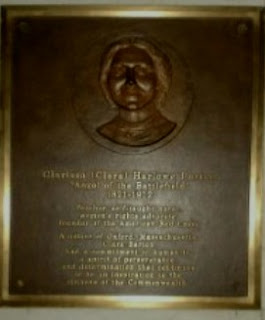Historical Profile: Mary Dyer
Boston, MA. — Mary
Dyer (1611–1660) was a Quaker known for her commitment to her religious viewpoints. She became a martyr after being hanged in
Boston, Massachusetts on June 1, 1660.
Dyer was born in England but left with her husband William to seek
religious freedom. Mary and William Dyer
arrived in Boston in 1635. While living
in Massachusetts Bay Colony, Mary Dyer defied a banishment order placed on her from
colony leaders. Puritan leaders within
the colony did not agree with the Quaker religious philosophy. This disagreement led the Puritans to make
laws against Quaker religious practices.
On
the day that she was executed, Dyer was asked to renounce beliefs in order to
save her life. Dyer refused to renounce
her beliefs. Before her death she said: “Nay,
I came to keep bloodguiltiness from you, desiring you to repeal the unrighteous
and unjust law of banishment upon pain of death, made against the innocent
servants of the Lord, therefore my blood will be required at your hands who
willfully do it; but for those that do is in the simplicity of their hearts, I
do desire the Lord to forgive them. I
came to do the will of my Father, and in obedience to his will I stand even to
the death.”
In
1997, Mary Dyer was inducted into the Rhode Island Heritage Hall of Fame and in
2000 she was inducted into the National Women’s Hall of Fame.
There
is a statue of Mary Dyer located in front of the Massachusetts State House in
Boston, Massachusetts. The monument,
sculpted by Sylvia Shaw Judson, was dedicated on July 9, 1959.
 |
| Mary Dyer statue at the Massachusetts State House. |


Comments
Post a Comment